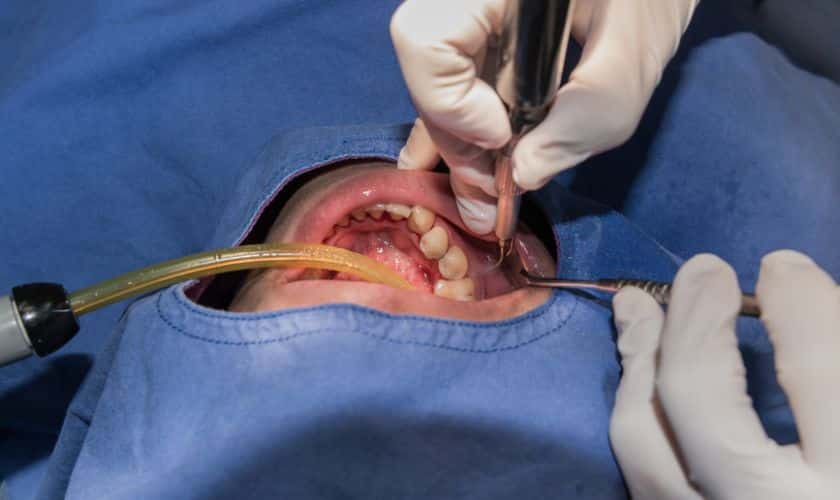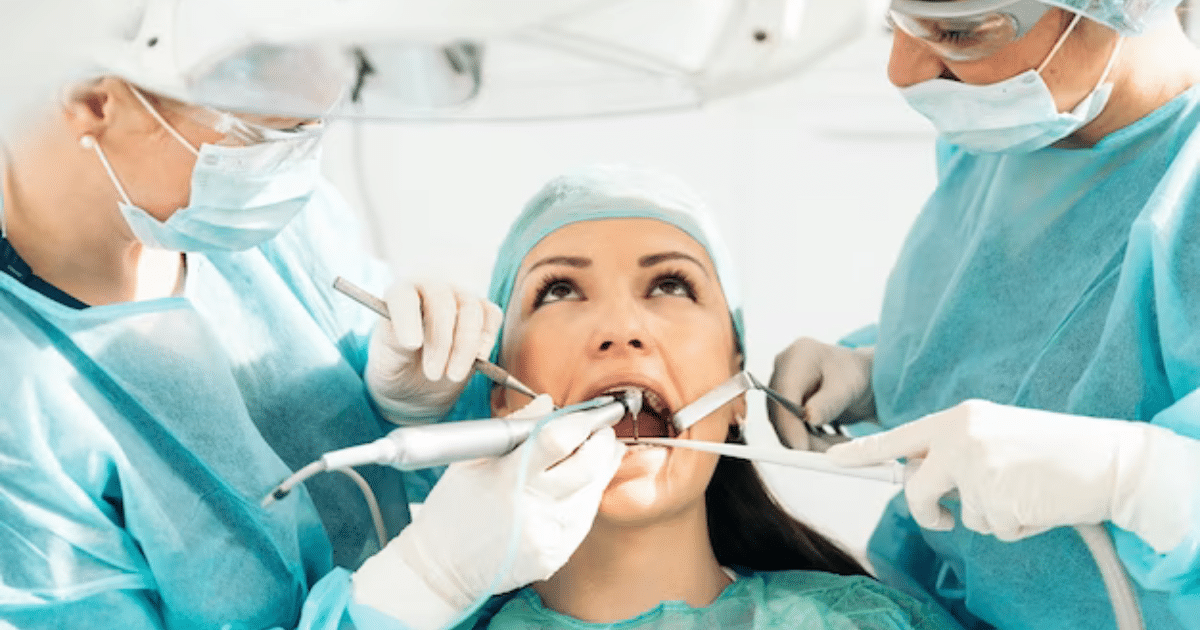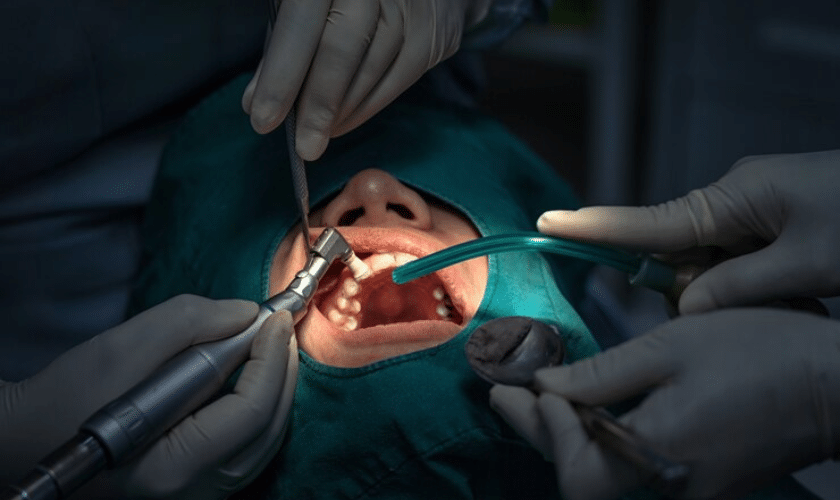
Are you scheduled for oral surgery? Whether it’s a wisdom tooth extraction or a more complicated procedure, preparing both mentally and physically is crucial. After all, undergoing oral surgery can be nerve-wracking. But don’t worry – we’ve got your back! In this ultimate guide to preparing for oral surgery, we’ll provide you with tips and tricks on how to prepare yourself before the big day, what to expect during the procedure itself, and how to ensure a smooth recovery afterward. So sit back, relax, and let us give you all the information you need to make your oral surgery experience as stress-free as possible!
The Basics of Oral Surgery
- Oral surgery is a branch of dentistry that deals with the diagnosis, surgical treatment, and management of oral diseases, injuries, and defects. It involves various procedures for the teeth, gums, jawbone, tongue, and other soft tissues inside the mouth.
- There are different types of oral surgery depending on what you need to be done. Common examples include tooth extraction (e.g. wisdom teeth), dental implant placement, gum grafting, or flap surgery for periodontitis treatment.
- Before undergoing any procedure, your dentist will discuss with you everything you need to know about it – including its benefits and risks – so that you can make an informed decision whether or not to proceed.
- During oral surgery, local anesthesia is usually used to numb the area being operated on. In some cases, however – especially if multiple teeth are being extracted at once – general anesthesia may be recommended instead.
- Oral surgery is considered safe when performed by a licensed professional who has undergone specialized training in this field.

Source: Freepik
Types of Oral Surgery
Oral surgery is a complex field that encompasses several different types of procedures. Here are some common types of oral surgery:
- Wisdom Teeth Removal: This is one of the most common types of oral surgery and involves removing the third molars (wisdom teeth) at the back of your mouth.
- Dental Implants: If you have lost a tooth or multiple teeth due to injury or decay, dental implants can help restore your smile by replacing missing teeth with artificial ones.
- Jaw Surgery: Also known as orthognathic surgery, this type of oral surgery corrects problems with jaw alignment and bite issues.
- Root Canal Therapy: A root canal procedure may be necessary if you have an infected or inflamed tooth pulp that needs to be removed in order to save the tooth from further damage.
- Bone Grafting: In certain cases where there isn’t enough bone tissue available for dental implant placement, bone grafting can help rebuild bone mass in your jaw.
It’s important to note that each patient’s case is unique and may require a customized treatment plan tailored specifically to their needs. Consultation with an experienced oral surgeon will help determine which type(s) of oral surgery is best suited for you and what steps are involved in preparing for it.
Source: Hunterdon Oral & Maxillofacial Surgical Specialists
How to Prepare for Oral Surgery
Preparing for oral surgery is an essential step to ensure a smooth and successful procedure. Here are some tips and tricks to help you prepare:
- Follow your dentist’s instructions: Your dentist will give you specific instructions on what to do before your surgery, such as fasting or taking medication beforehand.
- Arrange transportation: Since you’ll be under anesthesia during the procedure, it’s important to have someone else drive you home afterward.
- Stock up on soft foods: After oral surgery, it’s best to stick with soft foods like yogurt, mashed potatoes, and soup for several days while your mouth heals.
- Plan time off work/school: Depending on the type of oral surgery, you may need a few days off work or school to recover fully.
- Get plenty of rest: Make sure you get enough sleep the night before your procedure so that your body is well-rested and ready for surgery.
By following these preparation tips, patients can feel more confident about their upcoming oral surgery knowing they have taken the necessary steps towards ensuring a successful outcome.
What to Expect During Oral Surgery
- Oral surgery can be a daunting experience, but understanding what to expect during the procedure can help ease any worries or anxieties you may have.
- During oral surgery, you will be given anesthesia to ensure that you do not feel any pain or discomfort throughout the procedure. Your surgeon will then make incisions in your gums and carefully work on the affected area.
- Depending on the type of surgery, your surgeon may need to remove teeth, bone, or tissue from your mouth. They will use specialized tools and techniques to perform these tasks with precision and care.
- Throughout the procedure, it is important that you remain still and relaxed so that your surgeon can work effectively. If at any point during the surgery, you feel uncomfortable or anxious, let your surgeon know right away so they can adjust accordingly.
- After the surgery is complete, your surgeon will provide instructions for post-operative care and follow-up appointments if necessary. It’s important to follow these instructions closely in order to ensure a smooth recovery process.
- While oral surgery may seem intimidating at first glance, knowing what to expect beforehand can help alleviate any fears you may have going into it. Trusting in your skilled surgical team and following their guidance throughout the process can also aid in a successful outcome.
Pre-Operational Checklist
- Before any oral surgery, it is crucial to prepare yourself physically and mentally. The pre-operational checklist can help you ensure that everything goes smoothly during your surgery. Here are the essential items to include in your pre-operational checklist.
- Firstly, make sure to arrange transportation for after the surgery as anesthesia may cause drowsiness or disorientation. It’s not safe to drive yourself home immediately following the procedure.
- Secondly, avoid eating and drinking anything for at least eight hours before the scheduled surgery time. This will prevent aspiration when under general anesthesia.
- Thirdly, confirm with your surgeon any medications that should be stopped prior to the operation such as blood thinners or aspirin which can increase bleeding risk during surgery.
- Fourthly, wear comfortable clothing that allows easy access to intravenous lines and monitors. Avoid jewelry such as earrings or necklaces on the day of your appointment.
- Ensure proper communication with your surgeon by discussing all concerns regarding medical history and current health conditions before undergoing oral surgeries. With this in mind, you’ll have more confidence going into the procedure and a better chance of successful recovery afterward!
Post-Operational Checklist
After successfully undergoing oral surgery, it is important to follow a post-operational checklist to ensure proper healing and avoid any complications. Your dentist or surgeon may provide you with specific instructions tailored to your individual needs, but here are some general guidelines:
- Follow the prescribed medication regimen carefully and take all medications as directed by your healthcare provider.
- Avoid smoking or using tobacco products for at least 24 hours after surgery as it may slow down the healing process.
- Refrain from consuming hot foods and drinks until the anesthesia wears off completely.
- Stick to soft foods like soup, yogurt, pudding, mashed potatoes etc., which require minimal chewing for the first few days following surgery.
- Keep your mouth clean by brushing gently around the surgical site with a soft-bristled toothbrush twice a day.
- Use ice packs on your cheeks in 20-minute intervals to minimize swelling during the initial two days after surgery.
- Do not rinse your mouth vigorously or spit forcefully as this can dislodge blood clots that help in healing and lead to dry socket (an infection of the bone).
By taking care of yourself properly post-surgery through these steps mentioned above, you will ensure optimal recovery time and reduce any potential discomfort experienced following oral surgery.
Recovery Tips After Oral Surgery
Proper preparation before oral surgery can help keep complications at bay, but the road to recovery doesn’t end with the procedure itself. Aftercare is just as crucial in ensuring a smooth and speedy recovery process.
Here are some helpful tips for post-operative care:
- Follow your dentist’s instructions carefully.
- Take all prescribed medications on time.
- Get plenty of rest and avoid strenuous activities for the first few days.
- Avoid smoking or using tobacco products, which can delay healing and increase infection risk.
- Stick to soft foods that don’t require excessive chewing until you’re fully healed.
- Keep your mouth clean by gently brushing your teeth twice a day or using an antimicrobial rinse recommended by your dentist.
Remember that every person heals differently, so be patient with yourself during this time of recuperation after oral surgery.
Source: KMTV 3 News Now
By following these guidelines and working closely with your dental professional, you should be well on your way toward a successful recovery after undergoing any type of oral surgery!
Preparing for oral surgery can be a daunting task, but with the right tips and tricks, you can ensure a smoother experience. First and foremost, follow your dentist’s instructions regarding fasting and medication intake prior to the surgery. Plan for your recovery by stocking up on soft foods, pain relievers, and ice packs. Arrange for someone to accompany you to the surgery and drive you back home. It’s crucial to keep your oral hygiene in check, so schedule a dental cleaning beforehand and follow any specific instructions provided. Lastly, prepare a comfortable recovery space with extra pillows and entertainment options. By following these guidelines, you can alleviate stress and promote a successful oral surgery experience.


